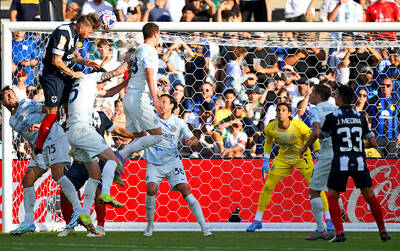As a nickname, March Madness is overused and overhyped, but it has worked out quite well for the NCAA men's basketball tournament on CBS. Companies yearn for phrases that will stick to their products as indelibly as March Madness has.
"I can't think of an event where madness so perfectly applies," said Sean McManus, the president of CBS Sports, "especially in the early rounds, with so much constant action, so many games and so many teams."
The term was parodied recently by the humorist Andy Borowitz, who wrote on TheBorowitzReport.com that under pressure from the National Institutes of Health, the NCAA changed the name to "March Bipolar Disorder."
There was no promotional strategy behind using March Madness to market the tournament. It just happened, and has stuck since 1982, CBS' first year in the madhouse. Kevin O'Malley, a former CBS Sports executive, recalled hearing the words for the first time one night early in the tournament.
"Brent Musburger used it," said O'Malley, an industry consultant. "Around that time, some people used the phrase in print. Maybe some Midwestern writers used it, but it really blossomed when the tournament expanded to 64 teams in 1985."
But March Madness, as a basketball term, had been used well before Musburger said it, by the Illinois High School Association. The group began running a boys' basketball tournament in 1908, and in 1939, its assistant executive secretary, Henry V. Porter, wrote an essay suggesting that a "little March madness may complement and contribute to sanity and help keep society on an even keel."
Porter could not have predicted how March Madness would spawn office pools and bracketology, thus destabilizing the country for three weeks every year. He amplified his theme in a poem in 1942 that read, in part:
The Madness of March
is running.
The winged feet fly,
the ball sails high
And field goal hunters
are gunning.
Illinois kept the madness to itself until Porter's creation, fresh out of Musburger's mouth, was picked up nationally by fans and the news media. Musburger was unavailable to comment on whether, having worked in Chicago as a print and broadcast journalist, he had adapted the phrase after hearing it locally.
CBS made the phrase ubiquitous, frustrating the Illinois group. In the ensuing years, that group and the NCAA tried to cancel each other's applications to obtain trademark protection for March Madness.
In the late 1990s, a federal circuit court ruled in a suit filed by the Illinois association against an NCAA sponsor, GTE, that the phrase had a "dual use" beyond the high school tournament.
"The court said the NCAA had not tried to hijack the phrase," said Scott Bearby, an associate general counsel for the NCAA Detente was eventually reached in 2000 when the two sides pooled their trademarks into one corporation.
If one goes by viewership, the madness is abating, something that Porter might have wanted to celebrate in an ode. In 1994 when Arkansas beat Duke, 32.7 million people watched the tournament's final game. Last year, when Connecticut defeated Georgia Tech, 17.1 million watched. In that period, the final's rating slumped from a 21.6 to an 11.0, while the overall tournament rating fell from an 8.3 to a 6.2.
Part of that is the natural erosion of ratings and the fragmentation of TV viewing habits. But McManus said the tournament's rating is an inadequate reflection of how many people are watching. He believes the erosion would be less if Nielsen Media counted viewers in restaurants, bars and dorms.

Brazil has four teams, more than any other country, in the expanded Club World Cup that kicked off yesterday in the US, but for SE Palmeiras, the competition holds a special meaning: winning it would provide some redemption. Under coach Abel Ferreira since 2020, Palmeiras lifted two Copa Libertadores titles, plus Brazilian league, cup and state championships. Even before Ferreira, it boasted another South American crown and 11 league titles. The only major trophy missing is a world champions’ title. Other Brazilian clubs like Fluminense FC and Botafogo FR, also in the tournament, have never won it either, but the problem for Palmeiras

Lionel Messi drew vast crowds and showed flashes of his brilliance when his Inter Miami side were held to a goalless draw by African giants Al-Ahly as the revamped FIFA Club World Cup got off to a festive start on Saturday. Fans showed up en masse for the Group A clash at the Hard Rock Stadium, home to the NFL’s Miami Dolphins, but Messi could not fully deliver, his best chance coming through a last-second attempt that was deflected onto the crossbar. Inter Miami next face FC Porto on Thursday in Atlanta, while Al-Ahly, who benefited from raucous, massive support, are to

Sergio Ramos on Tuesday outfoxed two Inter players and artfully headed home the first goal for Monterrey at the FIFA Club World Cup. The 39-year-old Ramos slipped through the penalty area for the score just as he did for so many years in the shirts of Real Madrid and Spain’s national team, with whom he combined smarts, timing and physicality. Ramos’ clever goal and his overall defensive play at the Rose Bowl were major factors in Monterrey’s impressive 1-1 draw against the UEFA Champions League finalists in the clubs’ first match of the tournament. “There is always a joy to contribute to the

Los Angeles Dodgers two-way star Shohei Ohtani on Monday wobbled through a 28-pitch first inning at home against the San Diego Padres in his first appearance on the mound since August 2023. Scheduled to throw as many as two innings, Ohtani went a single frame while allowing one run on two hits. He did not issue a walk nor strike out a batter. “Not quite happy with the results overall, but the takeaway for me is that I feel good enough to be able to make the next outing,” Ohtani said of his pitching performance. Ohtani still wound up with a positive impact